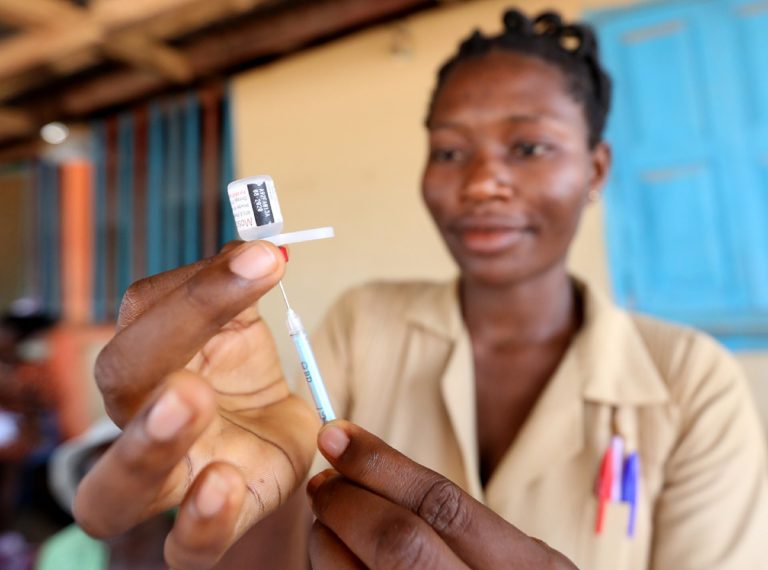Nigeria has received its first doses of the malaria vaccine donated by GAVI, the Vaccine Alliance and produced in a collaboration between Oxford University and the Serum Institute of India (SSI), as part of a new effort to reduce malaria cases and deaths in the country.
According to the World Health Organization (WHO), Nigeria recorded 58 million cases of malaria in 2022, leading to 194,000 deaths the previous year.
The disease, particularly prevalent in the northern and northeastern regions, remains a major threat, especially to young children. WHO data shows that in 2021, malaria caused 20% of all deaths in Nigerian children under five.
In 2023, WHO added the R21/Matrix-M malaria vaccine to its list of prequalified vaccines, following recommendations from its Strategic Advisory Group of Experts (SAGE) and the Malaria Policy Advisory Group.
Nigeria has so far received 846,200 doses of the R21 vaccine, with 153,800 more expected by late October, bringing the total to one million doses.
This delivery is expected to reduce all-cause mortality in children under five by 13 percent according to the Executive Director and Chief Executive Officer National Primary Health Care Development Agency (NPHCDA), Dr Muyi Aina. This is in addition to an expected 22 per cent reduction in hospitalisation due to cases of severe malaria.
How serious is malaria in Nigeria?
Malaria remains a critical public health issue in Nigeria, one of the countries with the highest disease burden.
Globally, WHO estimated 249 million malaria cases and 608,000 deaths in 2022, with African nations, including Nigeria, accounting for 94% of cases and 95% of deaths.
Children are especially vulnerable, with nearly half a million African children dying from malaria each year.
How does the R21 malaria vaccine works?
The R21 vaccine uses adjuvant technology to enhance the immune system’s response, specifically targeting the sporozoite stage of the malaria parasite. This stage is the first phase of the malaria parasite’s life cycle in the human body.
When a mosquito carrying malaria bites a person, it injects sporozoites into the bloodstream. These sporozoites travel to the liver, where they mature and multiply, eventually causing malaria symptoms.
This is the initial form of the parasite that enters the human body through a mosquito bite. By focusing on this stage, the vaccine helps block the parasite from reaching the liver, where it matures and causes infection.
This technology helps the immune system recognize and remember the pathogen more effectively, offering better protection against future infections.
What is the efficacy of the R21 vaccine?
With sufficient vaccine supply, the R21 vaccine is expected to prevent up to half a million child deaths over 12 years if scaled up across GAVI-eligible countries.
In 2021, the University of Oxford, released data which shows a 77 per cent efficacy rate for its malaria vaccine.
The data, published in the Lancet, said that the R21 vaccine showed up to 77% efficacy in a phase 2b trial of 450 children in Burkina Faso over 12 months.
The young children, all under 18 months old, had three doses and have since had a further booster jab split over high and lower doses. Efficacy was 77% in the high-dose adjuvant group and 74% in the lower-dose group.
Who will receive the vaccine?
The vaccine rollout in Nigeria is set to begin in November 2024, with Kebbi and Bayelsa states chosen as pilot areas due to high malaria prevalence.
Children aged five to 15 months will receive four doses of the vaccine as part of routine immunization programs, with the rest of the states to follow in two additional phases by 2025.
WHO recommendations for vaccine use
WHO recommends the use of malaria vaccines to prevent P. falciparum in children living in regions with moderate to high transmission, especially in the sub-Saharan Africa.
The R21 vaccine targets P. falciparum, the deadliest and most widespread malaria parasite in Africa. Countries can tailor vaccination schedules based on local transmission patterns, with the vaccine forming part of broader national malaria control plans.
Are malaria vaccines the complete solution?
While the vaccines are a vital tool, WHO stresses the importance of combining them with other measures, such as insecticide-treated bed nets, indoor spraying, and rapid treatment. Also, Nigeria’s health minister, Muhammad Pate, reiterated that the vaccines will complement existing malaria control methods, rather than replace them.


